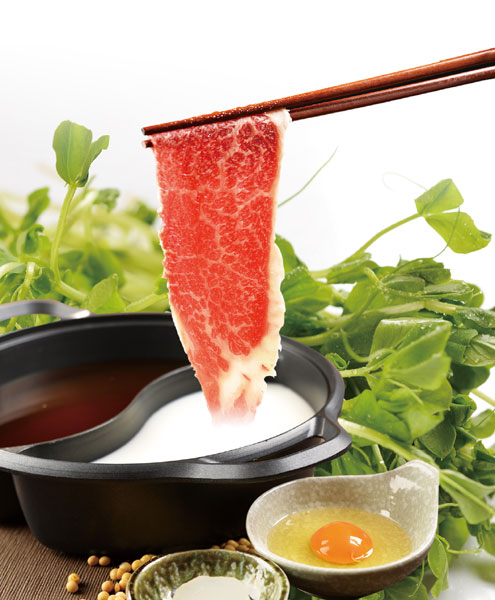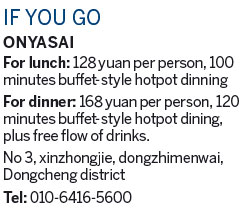 |
|
The raw egg dip offsets sukiyaki's sweet and salty edge. [Photo provided to China Daily]
|
Beaten raw eggs as the dipping sauce for hotpot? Sound risky and gross? Nonetheless, it is a popular way of eating the Japanese-style hotpot sukiyaki. Now you can try an authentic version in Beijing as the Japanese chain restaurant brand Onyasai opens its first store in Beijing featuring two classic hotpot styles: shabu-shabu and sukiyaki.
The menu offers eight choices of soup bases. Our favorite is the sukiyaki that is said to be brewed beforehand with 13 different vegetables for seven hours with the addition of grilled cow marrow-bone. The soup is paired with eggs as the dipping sauce for cooked sukiyaki beef and vegetables. The sweet and salty sukiyaki flavor gets mild and succulent when dipped with the raw-egg sauce.
But not all kinds of eggs can be eaten raw, depending on the freshness and quality. The eggs offered at Onyasai are called "Yodo" eggs, which are produced based on Japan's advanced technology used to produce "music eggs". Chickens are given soft and pleasant music every day, and fed with feed processed from a mixture that includes corn, seaweed powder, wheat powder, carrot powder and defatted soybean powder.
The Yodo eggs are evenly shaped and have lustrous shells. The egg yolk has a rich, reddish yellow tint and a higher viscosity; the egg white is chewier. The hotpot restaurant also boasts that it offers only fresh vegetables from organic farm that can be traced.
Besides sukiyaki soup, Onyasai offers seven other soup bases, namely, kelp, tomato, collagen soybean, curry, Japanese-style "devilish spicy", miso, and Taiwan-style Wulao spicy. Dinners can pair any two of them to make their customized hotpot.
It's also good news for meat eaters: Onyasai offers quality meat with different varieties including Australian Wagyu beef shoulder, Australian Wagyu chuck, origin specialty mutton, and Boston butt (pork shoulder).



























 Raymond Zhou:
Raymond Zhou: Pauline D Loh:
Pauline D Loh: Hot Pot
Hot Pot Eco China
Eco China China Dream
China Dream China Face
China Face






